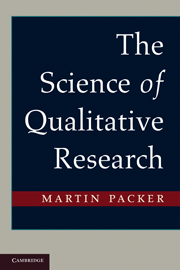Book contents
- Frontmatter
- Contents
- List of Figures and Tables
- List of Boxes
- Acknowledgments
- Introduction
- Part I The Objective Study Of Subjectivity
- Part II Ethnographic Fieldwork – The Focus On Constitution
- Part III Inquiry With An Emancipatory Interest
- 11 Qualitative Research as Critical Inquiry
- 12 Emancipatory Inquiry as Rational Reconstruction
- 13 Social Science as Participant Objectification
- 14 Archaeology, Genealogy, Ethics
- 15 A Historical Ontology of Ourselves
- References
- Name Index
- Subject Index
11 - Qualitative Research as Critical Inquiry
- Frontmatter
- Contents
- List of Figures and Tables
- List of Boxes
- Acknowledgments
- Introduction
- Part I The Objective Study Of Subjectivity
- Part II Ethnographic Fieldwork – The Focus On Constitution
- Part III Inquiry With An Emancipatory Interest
- 11 Qualitative Research as Critical Inquiry
- 12 Emancipatory Inquiry as Rational Reconstruction
- 13 Social Science as Participant Objectification
- 14 Archaeology, Genealogy, Ethics
- 15 A Historical Ontology of Ourselves
- References
- Name Index
- Subject Index
Summary
Critical theory is a metaphor for a certain kind of theoretical orientation which owes its origin to Kant, Hegel and Marx, its systematization to Horkheimer and his associates at the Institute for Social Research in Frankfurt, and its development to successors, particularly to the group led by Jürgen Habermas, who have sustained it under various redefinitions to the present day.
Rasmussen, 1996, p. 11The notion of critique takes us back once again to the philosophy of Immanuel Kant and to Georg Hegel’s response. We saw in Chapter 7 that Kant considered the primary task of philosophy – perhaps its only task – as critiquing knowledge rather than justifying it. He proposed a “critical philosophy” that would explore the conditions for the possibility of true knowledge. We have seen that for Kant these conditions were transcendental, universal, a priori concepts. Kant maintained that a universal capacity for reason provides the basis for each individual’s “Enlightenment” (German: Aufklärung) because it can “free our concepts from the fetters of experience and from the limits of the mere contemplation of nature” (Kant, 1784/2000, p. 402):
Enlightenment is man’s emergence from his self-incurred immaturity. Immaturity is the inability to use one’s own intellect without the guidance of another. This immaturity is self-incurred if its cause is not lack of understanding, but lack of resolution and courage to use it without the guidance of another. The motto of enlightenment is therefore: Sapere aude! Have the courage to use your own understanding!
(Kant, 1784/2000, p. 401)For Kant, enlightenment is something one achieves individually, and maturity amounts to independence and the ability to decide for oneself what is right and what is true.
Hegel took a different position, arguing that the conditions for knowledge are historical, so that enlightenment is a social process that depends on relationships and participation in community. In this chapter, I will explore what Marx did to the concepts of critique and enlightenment, and how the group of scholars known as the Frankfurt School built on his work to expose the irrationality lurking at the heart of Enlightenment rationality. But first it is important to mention one portion of Hegel’s reconstruction of the development of consciousness that has received considerable attention: his account of the “master–slave” dialectic, the struggle between what he called “lord” and “bondsman.” This analysis has been influential in psychoanalysis (accounts of the superego), Marxism and critical theory (the class-consciousness of workers), feminist theory (standpoint epistemology), and race studies.
- Type
- Chapter
- Information
- The Science of Qualitative Research , pp. 273 - 288Publisher: Cambridge University PressPrint publication year: 2010



